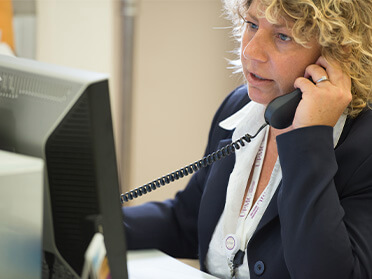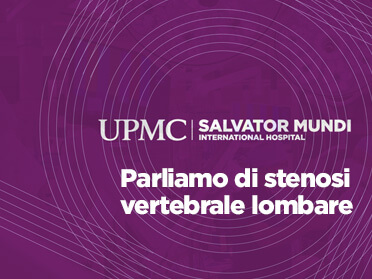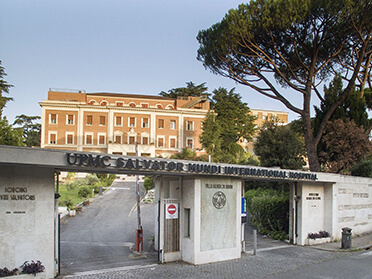Neurosurgery at UPMC Salvator Mundi International Hospital
UPMC Salvator Mundi International Hospital has a Neurosurgery service for the diagnosis and treatment of disorders and pathologies affecting the central and peripheral nervous system. These include the brain, spine, peripheral nerves, and arteries in the neck.
Our specialists use advanced diagnostic and interventional techniques and high-tech equipment and perform minimally invasive surgery.
What are Neurosurgery Services?
Neurosurgery is the specialized branch of medicine that surgically treats pathologies of the nervous system. Depending on the pathology to be treated and the general health conditions of the patient, neurosurgery is performed with traditional or minimally invasive techniques. These, in particular, tend to reduce possible post-operative complications and recovery times after the operation.
Neurosurgery is usually aimed at reducing and removing tumors and treating brain aneurysms and vascular diseases involving the brain. In addition, they are aimed at treating pathologies of the spine and peripheral nerves. They also include transplants, which become necessary when nerves are damaged by traumatic injuries caused, for example, by a car accident.
Neurosurgery Procedures
In the surgical treatment of brain diseases, our doctors often resort to the keyhole approach. Thanks to the use of digital technologies, in fact, it is possible to identify the most suitable point in which to practice cutting to introduce endoscopic instruments. And, with this methodology, it is therefore possible to reduce the size of the incisions and, therefore, of the scar that will remain after surgery.
As for spine pathologies, however, our specialists prefer, whenever possible, to use minimally invasive percutaneous techniques. Among these, the most used are:
- Nucleoplasty by coblation, for the treatment of herniated disc: Through a very small incision, the surgeon introduces an electrode into the intervertebral disc that emits energy and dissolves the soft tissue rich in water. In this way, the pressure on the nerves decreases and, as a result, the pain is relieved.
- Percutaneous discectomy: With this technique, the doctor removes the tissue of the protruding disc by means of a microforceps introduced through a cannula.
- Interlaminar or transforaminal endoscopic technique: This methodology allows you to remove the entire vertebral disc. It uses microsurgical instruments, which are introduced through a cannula, and a high-resolution video camera.
Pathologies Treated at UPMC
Our specialists treat all acute and chronic pathologies involving the brain, the base of the skull, peripheral nerves and spine. Among them, the most common diseases are:
- Benign and malignant neoplasms of the brain, base of the skull and pituitary gland.
- Neurovascular conditions, such as cerebral aneurysms, cavernous angiomas, cerebral hemorrhages, cavernous sinus thrombosis, stroke.
- Congenital anomalies, such as vascular malformations. These are alterations in the blood vessels within the brain that can cause bleeding or insufficient blood supply to the organ.
- Disorders of the cranial nerves, caused by damage or dysfunction. An example of these disorders is trigeminal neuralgia, a chronic painful condition that mainly affects people over 50 years of age.
- Movement disorders, such as Parkinson's disease, which causes muscle stiffness and is manifested by tremors and difficulty in making movements.
- Epilepsy, one of the most frequent neurological diseases. In those who suffer from it, the brain is predisposed to the onset of partial or generalized seizures. These crises can manifest themselves with sudden bursts, difficulty speaking, states of unconsciousness.
- Craniofacial injuries and trauma.
- Craniofacial malformations due to incorrect development of the soft and skeletal tissues of the embryo during pregnancy.
- Tumors of the spine and spinal cord.
- Degenerative diseases of the spine, such as scoliosis.
- Back pain and inflammation of the sciatic nerve.
- Fusion of vertebrae.
- Trauma and spinal injuries.
- Congenital deformities or caused by diseases such as arthritis, or fractures.
- Carpal tunnel syndrome.
Who is Neurosurgery For?
A neurosurgical examination is always necessary if you have suffered trauma to the spine or damage to the peripheral nervous system. For example, following a car accident or sports accident. In addition, you can contact UPMC for the surgical treatment of a tumor pathology of the spine or brain.
Neurosurgery can help you resolve painful conditions that more conventional or pharmacological approaches have failed to cure. For example, those back pains that are caused by hernias or fusion of intervertebral discs.
The neurosurgery specialists at UPMC Salvator Mundi International Hospital will direct you to the right surgical solution for you. They work in close active collaboration with the team of doctors who work at the Mondino Foundation – National Neurological Institute IRCCS of Pavia.
Our Doctors
Neurosurgery at UPMC

We offer medical services and services on a private basis or in agreement with the main insurance companies. Some of our services are also affiliated with the National Health System.
For more information on active agreements, visit:


